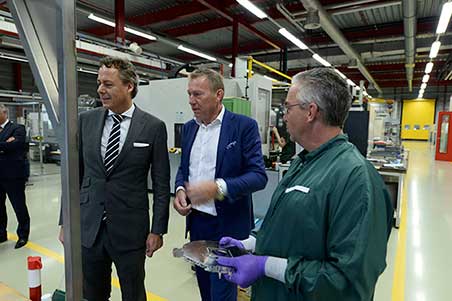ING Innovation Index: The Netherlands is ready for digitalisation, but not in every sector
12 oktober 2015
The rapid pace of global technological developments is undeniable. But what is the impact of these innovations on our country and how is the Netherlands dealing with the changes? During a visit by CEO Ralph Hamers, to Brainport Regio on Friday, 9 October, ING launched the Innovation Index. Marieke Blom, ING Netherlands’ chief economist, explained how the Netherlands scored in the field of innovation and arrived at three important outcomes:

CEO Ralph Hamers visits Brainport Regio
- The complexity of the change differs significantly in each sector and in each province. In manufacturing and agriculture in particular, all break-through technologies converge: from robotics and new materials to Big Data and the Internet of Things. The change in these sectors is expected to be complex and difficult to predict.
- Each province differs considerably in its ability to adapt.
The provinces in the Randstad conurbation and the provinces of Flevoland and North-Brabant have access to a highly skilled, young professional population and a dynamic business sector and encounter less complex change. This is not true of the other provinces.
- In general, the Netherlands is well-positioned for change.
The Randstad conurbation, Flevoland and North-Brabant – two-thirds of the economy – are well-positioned given the lower complexity of changes and a higher adaptability. Improving the position of the other provinces offers additional growth opportunities at the same time.
Apart from the Internet of Things and Computing Power, alternative energy can also have a major impact because a large part of the Dutch economy is still reliant on fossil fuels. New materials, but robotics and 3D printing in particular, are relatively unimportant for the Netherlands.
In comparison with manufacturing and agriculture, the complexity of the change is much smaller for the service industry. Big Data and Computing Power have a major impact on this industry, but the scale of technologies that play a role is smaller. The complexity of the change is therefore not as great. In sectors such as hotels and catering, sport, entertainment and recreation, the impact of technology is relatively limited.
No robots, but the Internet of Things
Blom also stated that thinking in the Netherlands would benefit from shifting the focus from robots to computers, data and the Internet of Things. It is digitalisation far more than robotisation that can shake up the Netherlands’ economy.
Five provinces, which together account for two-thirds of the Dutch economy, are in a good position and that is good news for the Netherlands. In Zeeland, Limburg, Overijssel, Drenthe and Friesland, the picture is different. Most of the economic actors here – employees and businesses – work on a very regional platform and cannot always keep up with the pace of change in the country. Nevertheless, there are huge opportunities in these provinces to achieve growth based on breakthrough technologies. If policymakers and the business sector work together to engage business operators in these provinces, the Netherlands will gain a huge growth engine.
Read the full version of ING Economics Department’s research report (Dutch only).
